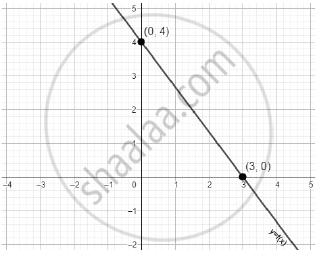Advertisements
Advertisements
प्रश्न
If the sum of the zeros of the quadratic polynomial `kx^2-3x + 5` is 1 write the value of k..
उत्तर
By using the relationship between the zeroes of the quadratic polynomial.
We have
Sum of zeroes= `(-("Coefficient of x"))/(("Coefficient of" x^2))`
`⇒ 1=-(-3)/k`
`⇒k=3`
APPEARS IN
संबंधित प्रश्न
The graphs of y = p(x) are given in following figure, for some polynomials p(x). Find the number of zeroes of p(x).

Find the zeroes of the quadratic polynomial `f(x) = 5x^2 ˗ 4 ˗ 8x` and verify the relationship between the zeroes and coefficients of the given polynomial.
If f(x) =`x^3-3x+5x-3` is divided by g(x)=`x^2-2`
Obtain all other zeroes of `(x^4 + 4x^3 – 2x^2 – 20x – 15)` if two of its zeroes are `sqrt5 and –sqrt5.`
If one zero of the quadratic polynomial `kx^2 + 3x + k is 2`, then find the value of k.
If 𝛼 and 𝛽 be the zeroes of the polynomial `2x^2 - 7x + k` write the value of (𝛼 + 𝛽+ 𝛼 𝛽.
Find the zeroes of the quadratic polynomial `f(x) = 6x^2 – 3.`
If the zeroes of the quadratic polynomial x2 + (a + 1) x + b are 2 and –3, then ______.
If 4x² – 6x – m is divisible by x – 3, the value of m is exact divisor of ______.
The given linear polynomial y = f(x) has

